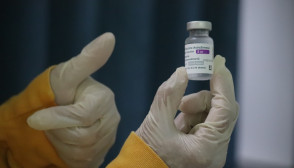WASHINGTON (Reuters) -The U.S. Senate will grapple on Tuesday with whether to increase payments to Americans reeling from the COVID-19 pandemic and override President Donald Trump's veto of a $740 billion defense bill, two measures set to lapse if lawmakers fail to act before a new Congress takes office on Sunday.
Democrats, with help from Trump's Twitter feed, are pushing for a vote on the additional money, a step they believe could give them an advantage in two Georgia runoff elections next week that will determine which party controls the Senate under President-elect Joe Biden's incoming administration.
The bill faces a tough path in the Republican-led Senate, with many Republicans pointing to hundreds of billions of dollars in added costs of COVID-19 relief.
Senate Majority Leader Mitch McConnell is expected to speak on the chamber floor at Noon (1700 GMT).
A combined $892 billion bipartisan coronavirus relief package and $1.4 trillion spending bill that Trump signed into law on Sunday contains $600 checks for people hit hard financially by a pandemic that has infected more than 19 million Americans and killed over 333,000.
The Democratic-led House of Representatives on Monday approved the increase in direct payments to $2000.
Trump's signing of the package staved off a U.S. government shutdown but he also pushed for the stimulus checks. He reasserted that demand on Tuesday, tweeting: "$2000 for our great people, not $600! They have suffered enough from the China Virus!!!"
Separately, the House on Monday voted to override the president's veto of the defense policy bill by 322-87. If the Senate seconds the House action, the bill becomes law. It would be the first veto override of Trump's presidency, which ends on Jan. 20 when Biden takes office.
A Senate vote on the defense bill veto had been expected on Wednesday but could be delayed until the weekend by political wrangling over the stimulus money.
With the New Year's Day holiday on Friday and a new Congress due to be sworn into office on Sunday, lawmakers have only a short time to act.
SENATE RESISTANCE
Final passage of the COVID aid increase in the Senate would require 60 votes and the backing of a dozen Republicans.
The Joint Tax Committee, a congressional panel that tracks federal spending, estimated on Monday that Trump's $2,000 checks would cost $463.8 billion.
Republican Senator Marco Rubio voiced early support for the increase. "I agree with the president that millions of working class families are in dire need of additional relief, which is why I support $2,000 in direct payments," he said in a statement late on Monday.
Senate Democratic leader Chuck Schumer also welcomed it.
"The House just took a strong, bipartisan vote to pass $2,000 checks," Schumer said on Monday.
"I'll move to pass the bill in the Senate. Workers, families and people are crying out for help. Every Senate Democrat is for this relief. Senate Republicans should not stand in the way."
Democratic Senator Bernie Sanders, who has championed higher direct payments to Americans, threatened late on Monday to block the Senate from moving quickly to override Trump's veto of defense bill until McConnell agrees to allow a vote on the $2,000 checks.
"This week on the Senate floor Mitch McConnell wants to vote to override Trump's veto of the $740 billion defense funding bill and then head home for the New Year," Sanders said on Twitter.
"I'm going to object until we get a vote on legislation to provide a $2,000 direct payment to the working class."
(Reporting by David Morgan; additional reporting by Susan Cornwell;Editing by Noeleen Walder and Alistair Bell)










